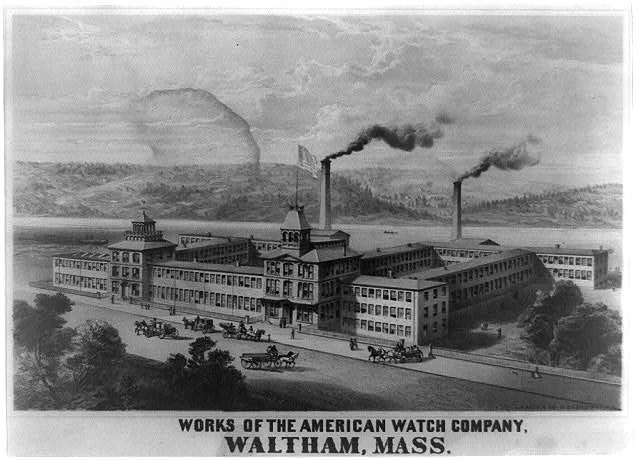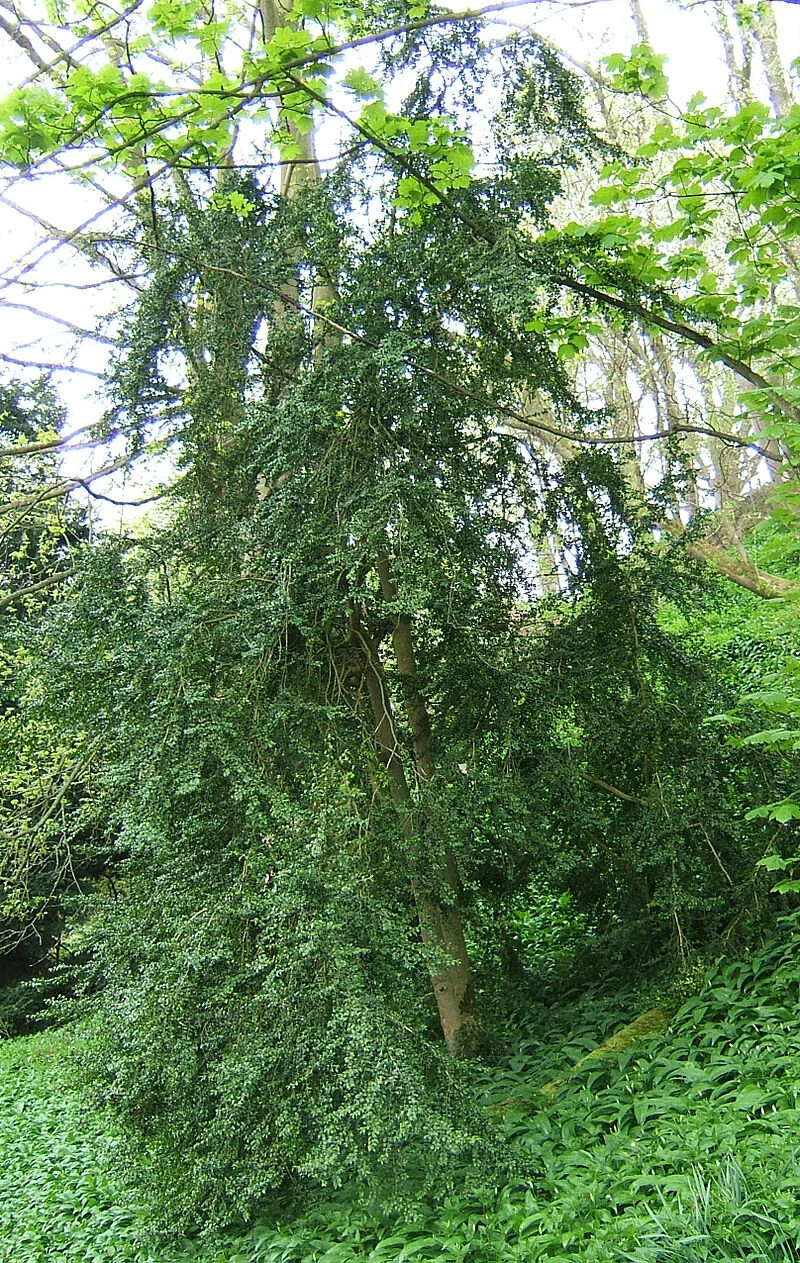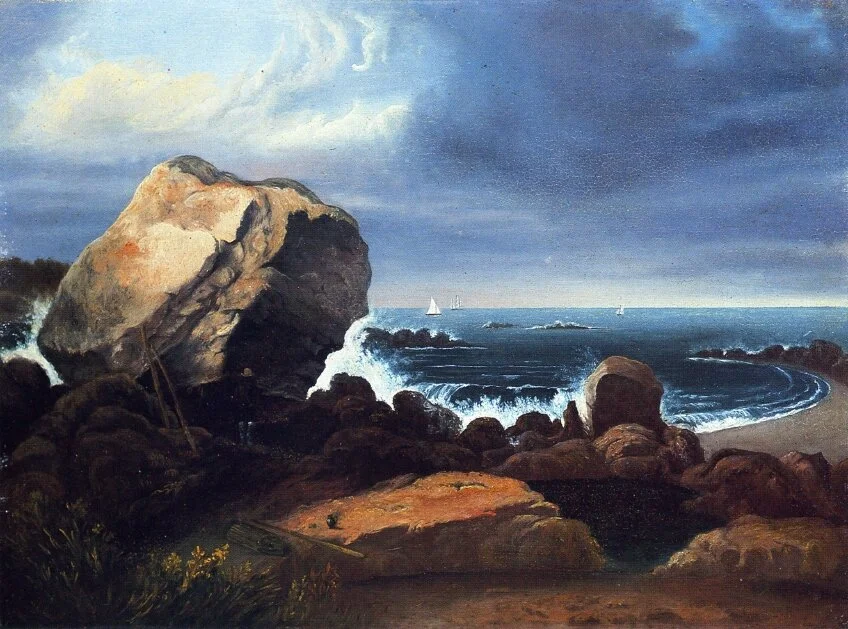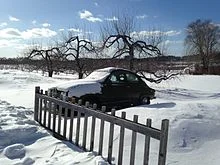
What they gave us
Naval Submarine Base New London is the primary U.S. Navy East Coast submarine base. It’s directly across the Thames River from its namesake city of New London. All U.S. subs are nuclear-powered.
“New Englanders gave us codfish and quahogs and atomic submarines. They gave us the America’s Cup races and Waltham Watches, town meetings and mill towns, village greens and fall colors.’’
— Ted Smart and David Gibbon, in New England: A Picture Book to Remember Her By
The Waltham Watch Company made about 40 million watches, clocks, speedometers, compasses, time-delay fuses and other precision instruments between 1850 and 1957. The company's 19th-Century manufacturing facilities, in Waltham, Mass., have been preserved as the American Waltham Watch Company Historic District.
Almost hypnotized by boxwood
Common boxwood
“I have heard New Englanders say that they have an affinity for Box {wood) — that it exerts power like a hereditary memory, and affects them with an almost hypnotic force. This is not felt by everyone, but only by those who have loved Box for centuries, in the persons of their ancestors.’’
— Eleanor Early (1895-1969), in A New England Sampler (1940)
Distraction via exploration
“Scituate Beach, Massachusetts,’’ byThomas Doughty, 1837
From Robert Whitcomb’s “Digital Diary,’’ in GoLocal24.com
When things in the world in general and/or in your own little world in particular seem almost intolerably tense, you can’t beat wandering around in nature without an itinerary for relief. I remember that fondly from my boyhood in a small, still partly rural, town on Massachusetts Bay. Alone, or with a pal or two, I’d go “exploring’’. And it was a good place to explore.
There were beaches, more pebbles than sand, with rocky headlands and innumerable sea birds, some of which would attack if you approached their nests. There were shark’s eggs to pick up, along with lovely sea glass (this was before the explosion of plastic pollution), and horseshoe crab shells amidst the seaweed dumped on the beach at the high-tide mark. (There were also tin cans to shoot at with BB guns.)
After northeast storms, we’d look for small boats that might have been tossed ashore.
Nearby were bullrush forests along the marshes, through which we’d make trails leading to little “rooms” we’d create. We’d use rowboats to explore the tidal rivers through the marshes, with their often sulfurous smells.
Sometimes in midwinter the more brackish and less salty marsh streams would freeze up and we’d do our exploring on skates.
Inland, small streams beckoned us to find their sources, and we’d check out a nearby farm, fragrant in certain weather with the aroma of manure, where we would sometimes intentionally irritate the bulls. There were rock-topped mini-mountains and tall oak trees to climb and abandoned houses to trespass in. (See poem fragment above.) And everywhere pleasing smells, such as of cedar trees, of which we had a lot, and flowering trees in May, of wet, newly cut grass and of rotting apples on the ground in the fall.
And the sights, smells and sounds could vary much from day to day, with the sharpest changes in early spring. Every day’s light was different.
What a miraculous world!
— Photo by Stefan-Xp
While this winter has generally been milder than usual, it looks like we won’t be getting the “January Thaw” – that sweet stretch of days with temps in the 50s that we often get at this time of year in New England, giving us a tempting taste of spring. A January Thaw would have been particularly appreciated by COVID-desperate restaurant owners because they could more comfortably serve customers outdoors.
Meanwhile, while most (?) New Englanders like mild winters, that our winters are getting warmer and shorter is a bad sign for the world, showing that man-fueled global warming is speeding up.
Actually, GE's lights are still on
From Robert Whitcomb’s “Digital Diary,’’ in GoLocal24.com
Lights Out: Pride, Delusion, and the Fall of General Electric, by Thomas Gryta and Ted Mann, memorably describes how one of America’s oldest, biggest and most celebrated companies started taking wrong turns under its charismatic (and probably over-rated) CEO Jack Welch and his successor, Jeff Immelt, and ended up much less profitable, smaller and weaker.
This is superb corporate history, with the right mix of historical context and big picture stuff and anecdotes that add spice to the tale of very smart, but sometimes very wrongheaded and arrogant, execs making disastrous mistakes as well as, to be fair, achieving some surprising successes. Overpriced acquisitions and mountains of debt played a big role in the burgeoning woes of the conglomerate, along with dubious creative accounting, which some have alleged verged on fraud.
It’s a sort of a mystery story: How could such a huge and diversified company get into such trouble?
By the way, from all the negative news about GE in the investment community in the past couple of years you might not remember that it remains a very big company. Last year, GE was ranked among the Fortune 500 as America’s 21st-largest firm as measured by gross revenue.
New Englanders in particular will want to read about the very human reasons that the company moved its headquarters to Boston after many years in Fairfield, Conn.
Dress rehearsal for big one
Tree and car whomped by Isaias in Waterford, Conn.
From Robert Whitcomb’s “Digital Diary,’’ in GoLocal24.com
After that surprisingly lively outer band of Tropical Storm Isaias’s rain and wind swept through Rhode Island last Tuesday, I went for a walk when it was still breezy. It was exhilarating. The storm had cleaned out the oppressive air and the world seemed briefly fresh and new again. People I passed on the street seemed in good spirits.
But the very brief event also warned of how much damage a full hurricane could do in our densely treed region. If 60-mile-an-hour gusts could take down so many branches and even some trees last Tuesday imagine what 100-mile-an-hour winds could do to our electricity system, roofs and cars parked under trees. (A tree crushed a car up the street from us Tuesday.) Actually, I don’t have to imagine much, having strong memories of what Hurricane Bob did just east of Providence in ’91, not to mention such earlier hurricanes as Donna, in ’60, and, as a little kid, Carol in ’54.=
Perhaps National Grid has learned a few new lessons from Isaias in getting ready for a real storm and its aftermath. Especially with sea-surface temperatures so high just south of New England acting as fuel if a hurricane heads this way, that tempest may come sooner rather than later. Stock up on Sterno!
xxx
‘New Englanders tend to be a bit wary, and so they don’t particularly exert themselves to meet new neighbors. Indeed, you might never meet people who have lived across the street from you for years. But I’ve noticed, on our block anyway, newcomers and long-established neighbors chatting away – about six feet apart -- much more these days as folks stroll to relieve claustrophobia and get mild exercise. Paradoxically, COVID-19 may be making neighbors friendlier.
“Funny how we’re all talking to each other now,’’ one lady down the street told me as I was walking our dog.
A New England personality?
The poet resting place in the Old Bennington Cemetery, Bennington, Vt. While he is deeply associated in writing and temperament with New England, he was born in San Francisco and spent much of his winters in later life in Florida.
“People in the north-central Great Plains and the South tend to be conventional and friendly, those in the Western and Eastern seaboards lean toward being mostly relaxed and creative, while New Englanders and Mid-Atlantic residents are prone to being more temperamental and uninhibited,’’ according to a study published online by APA’s Journal of Personality and Social Psychology.
I think that there’s something to this, though I might add “irascible’’ for New Englanders. And what do they mean referring to “Eastern Seaboard”? Isn’t New England there? For the region with the most crooked folks, I vote for the South, with its sweet-talking con men.
These studies are lots of fun but of course have marginal utility. To read more, please hit this link.
What makes a New Englander?
Apple orchard in Hollis, N.H.
From a 2002 commentary by the Voice of America
Every region of the United States has its bittersweet stereotype. People from the American West are reputed to be long of limb, folksy, at home with nature. Those from the Midwest are solid, corn-fed, plain-speaking "heartlanders." "Yankees", who hail from the older, more settled regions of New England in the northeastern United States, are said to be stubborn people of few words.
Ninety-two-year-old Ruth King-Sanborn sits on a horsehair couch overlooking the hardscrabble New Hampshire farm and mill her ancestors bought back in 1773, when this part of the world was still a remote British colony. But don't ask her to get too emotional about the place.
"New Englanders are loath to discuss their feelings. I think the first thought that occurs to me is that people kept their thoughts to themselves. People did not say that they feel bad about something. I'm using the past tense now. I think it was the isolation. We were isolated here. If I didn't go to school, it would've been weeks when I wouldn't have seen anybody outside of the family!" she said.
Colin Cabot and his wife recently bought the farm and mill from Ms. King-Sanborn's family, hoping to restore it. Before moving here, the couple had lived in a small farming community in the rural Midwest. That was a place where people tended to spend time only with their own religious and ethnic kind.
"… and there it is very clearly either Catholic or Lutheran, and the Catholics and the Lutherans don't talk to each other very much. And they can live across the street from each other, and they don't like it. So when I came to New Hampshire, I thought I'd have the same kind of farming community. But the difference is the New Englanders are individualists, they are completely independent. There may have been political differences or religious difference before the Revolution back in 1770. And now, those differences are forgotten, but the fact is they know they are different than their neighbor. And it doesn't take any specific form, but that's not the way I do it," Mr. Cabot said.
To underscore this idea, Mr. Cabot points to the dented New Hampshire license plate on his pick-up truck. It bears the state motto: "Live Free or Die."
"Yeah, right. Some people say the real Yankees are the way they are because they didn't leave when everyone else went away and therefore they are sort of the cantankerous ones, because they could have gone to the Midwest and made a killing. They were insane and stubborn then, and they are more stubborn now because the genes have been perpetuated," he said.
Not everyone feels that way.
"Sometimes people think of Yankees as being cantankerous [grouchy] [and] as being a little bit aloof. But in fact, that is not the case at all. It's just that people are very thoughtful, they do want to make up their own minds."
That's Jean Sheheen, the {then} governor of New Hampshire. She is proud of the legendary independent-mindedness of people in her state, which is on national display every four years during the early days of American presidential campaigns.
"People are used to having candidates for president come through their living rooms and having the opportunity [to talk with them], and I think many people feel like they have the right to ask those people why they are running for president and what they want to do and challenge their thoughts and their issues. And that's good for the democratic process in this country," Ms. Sheheen said.
Norman Macintyre, who runs a fish auction up in Portland, Maine, to the north of New Hampshire, agrees that his fellow New Englanders tend to keep their own counsel. But he adds that they are also very supportive of each other.
"My example for that is the ice storm we had in the winter of 1997 and 1998. There was very severe ice storm here. Many people were out of power for two weeks or more. Shelters opened up immediately. Teenagers went to work in the shelters just volunteered automatically. You would find ads in the newspaper that said 'I have a generator, I've got my power back. If someone wants to borrow my generator, just call such and such a number.' There was no looting. There was no theft. There were no crimes against the public during that period. Whereas, if it was in South Central Los Angeles, I think it would have been different," he said.
Some predict the demise of the traditional crusty New England personality, due to the influence of global media and the influx of immigrants to the region. But this outcome is far from certain. Even Robert Frost, the quintessential Yankee poet, expressed competing sentiments about this in the same poem. He wrote, "Good fences make good neighbors." But he also wrote, "Something there is [in us] that doesn't love a wall."
Our invention of 'wilderness'
This is a nice piece by the charming (on paper and in person) writer Ted Widmer about "how New Englanders invented wilderness.''
Traumatized by speech and psycho-ceramics
By ROBERT WHITCOMB
‘Father Hoffman mixed personal opinion and church teaching in a way that offended everyone present, causing great harm,” said Prout School Principal David Carradini a couple of weeks ago. He was profusely apologizing for having the Rev. Rocky Hoffman, a host of Relevant Radio, a Catholic radio network, speak to the students of the Catholic high school, in South Kingstown, R.I. Father Hoffman, a member of the conservative Catholic society Opus Dei, spoke against homosexuality and divorce.
His views would have been considered standard Catholic fare only a few years ago, and are still held by many Catholics, and others.
Now, I’m not Catholic. Still, I salute the Church for much of its work, especially for the poor, and, yes, for the quality of Catholic schools. Anyway, we’re in a bad way in America if high-school students are to be prevented from hearing someone else’s views on morality. Where, exactly, is the “harm”? If these kids are seen as imperiled by listening to some priest, then how will they survive in the big, bad world? And how does Mr. Carradini know that the talk “offended everyone present”? (And so what if it actually did?)
Are our kids (and some of their complaining parents) really such lambkins that they can’t take the expression of strong opinions without collapsing in a heap? What’s there to apologize for, Mr. Carradini? Why doesn’t he just bring in some Catholic luminary with more “up-to-date” views as an offset? As they say, the cure for unsettling free speech is more free speech disputing it. And give all the kids debate lessons that nurture the capacity to understand and tolerate other views, including Father Hoffman’s traditionalist views.
Meanwhile, I’d suggest that if you don’t like Catholic beliefs, then don’t be a Catholic. Free will is an important part of the Church’s theology, at least for people from confirmation age on.
In other academic silliness, the student senate at the University of California at Santa Barbara (that cool, rich place) has passed a resolution requiring faculty to issue “trigger warnings.”
As Maria LaMagna reported in Bloomberg View: “Professors would write notes on their syllabi to alert students on which occasions a course’s material will be, say, sexually graphic. Students could then excuse themselves from class without being punished academically.”
Well, I think today’s college students are pretty familiar with sex, graphic or otherwise. They can handle such images. More to the point is that many courses that provide such material are devoid of academic rigor and a waste of time and money, sort of like Brown University’s long joked-about and nonexistent Prof. Josiah Carberry and his discipline of “psycho-ceramics”.
***
Northern Maine is poor, with lots of smokers and obesity, and yet their health-treatment outcomes metrics rank higher than much of the country (especially when compared with the South).
The reasons, summarized by Noam Levy in the Los Angeles Times, include:
•A strong safety net, which provides, among other benefits, more recommended screenings and medical treatments.
•An emphasis on preventive care, aided by Maine’s high number of primary-care physicians.
•Highly coordinated and data-driven care.
•Highly advanced data systems.
•Close collaboration between two competing hospital groups.
•A strong sense of civic obligation, including strong leadership by the public and private sectors.
The glue that keeps this all together is a vibrant sense of community, a sense missing in much of sprawling suburban America, with its subdivisions, gated communities and ever wider divisions of wealth. Mr. Levy quotes Dr. Jack Wennberg, founder of the Dartmouth Institute for Health Policy and Clinical Practice, as saying, “We used to joke that everyone gets along in northern New England because every hospital is separated by a mountain and the winters are long, so we’re happy to see someone.”
Or maybe Robert Frost’s related phrase will do: “Home is the place where, when you have to go there, They have to take you in.” New Englanders may not be the friendliest people in the nation, but, especially like Upper Midwesterners (who are friendlier), they have a strong sense of obligation, both in what their governments should do and what they should do individually.
***
The first words of T.S. Eliot’s poem “The Wasteland” are too often dragged out now. “April is the cruellest month ... ” (breeding tax bills out of ... ) Instead, how about the cheery first few lines, in Middle English, of the prologue of Chaucer’s “The Canterbury Tales”? We had to memorize the prologue’s first 18 lines in school and I’m glad we did, especially after this long winter.
Whan that Aprille
with his shoures soote,
The droghte of March
hath perced to the roote,
And bathed every veyne
in swich licóur
Of which vertú engendred
is the flour;
Or, more realistically, for New Englanders, Hemingway’s line from “A Moveable Feast”: “When the cold rains kept on and killed the spring, it was as though a young person died for no reason.”
Respond via rwhitcomb51@gmail.com
Our weather narcissism
By ROBERT WHITCOMB
Inevitably, some politicians and entertainers (e.g., Rush Limbaugh) are having great fun with the cold and snowy winter in the East and Midwest, saying that this shows that “global warming” is a fraud.
But they are extrapolating from immediate experience and anecdote, not science. I suspect that most of these people know better, but, hey, they’re in show biz.
Actually, January, for instance, which the news media lamented for its cold, snow and ice, has been rather severe in the eastern U.S. because of a huge dip in the jet stream that has brought cold (though not unprecedented cold) to the Upper Midwest and the Northeast while out West, including Alaska, it’s generally been very warm and dry for this time of year. Northeasterners and Midwesterners have endured temperatures 10, 15 or more degrees below normal; Alaska and California have been 10-15 degrees above. And the National Oceanic and Atmospheric Administration reports that January was, on a global basis, the fourth-warmest on record.
That the Northeast is so densely populated and that much of the national news media are based in New York and Washington mean that the idea that this winter is particularly bad has particularly strong currency. It recalls E.B. White’s funny 1954 essay “In the Eye of Edna,” in which he noted that the nation lost interest in Hurricane Edna after it moved beyond Boston’s radio and TV stations to wallop White’s comparatively remote Mid-Coast region of Maine.
Then there are such relatively new weather-news outlets as the Weather Channel and Accuweather. These commercial outlets will die if they fail to constantly dramatize such old weather phenomena as “The Polar Vortex” — a low-pressure area in upper latitudes that now is presented almost as a new and lethal threat to civilization. Weather events that would have seemed par for the course of a season a half century ago are now characterized as world-historical events.
Changes in the route of the jet stream from time to time bring cold air deep into the eastern part of the United States while the other side of the country becomes much warmer than usual as the jet stream brings in mild, Pacific air from the southwest. The jet stream’s position, of course, can vary widely but it can sometimes get stuck, meaning warm, “open” winters for us some years and cold ones in others. The general trend, though, is for milder winters. The trouble is that we confuse events in our areas that are part of weather’s natural variability with global climate change.
The confusion of one’s particular circumstances with the wider reality reminds me of the heartening rise in recent years of “evidence-based medicine” as opposed to the more traditional “expert-based medicine.” I am simplifying, but evidence-based medicine relies much less on individual physicians’ experience, values and judgment and much more on cold, hard data derived from rigorous collection and analysis of information from broad populations. As with medicine, so with climate, follow the data.
Anyway, New Englanders have suffered through another week of below-normal weather and are heartily sick of it. That the population is aging and that old people, in particular, find winters wearisome may reinforce the winter fatigue of younger people, too.
In some winters, snow drops and crocuses would be popping out of south-facing slopes about now. It looks as if we’ll have to wait a while for them this year. Still, a gradual change in the mix of morning bird song and that there’s bare ground around the base of trees where there was snow a week or two ago reminds us that the sun is getting stronger by the day: Some birds are coming north again and there’s more solar energy for the trees to absorb. And on one of our recent, and for this winter, rare mild days, I found the worms wiggling enthusiastically in our compost bin, whose contents seem to have been frozen solid a couple of days before. Worms: A reminder of the cycles of death and life.
***
The Feb. 23 New York Times business section story “Loss Leader on the Half Shell: A national binge on oysters is transforming an industry (and restaurants’ economics)” was heartening for a coastal New Englander. It implied that our estuary-rich region could benefit a lot from much expanded shellfish aquaculture. Unlike, say, casinos, which are a net subtraction from a region’s economy, or local businesses that recycle money that’s already here, aquaculture, because it has exportable physical products and brings people here from far away to buy them in our eateries as local specialties, increases our region’s wealth.
And the business, with its demands for clean water, prods us to keep our coastal environment cleaner.
Robert Whitcomb (rwhitcomb51@gmail.com), a former Providence Journal editorial-page editor, is a Providence-based writer and editor and the overseer of www.newenglanddiary.com. He is also a director of Cambridge Management Group (cmg625.com).









